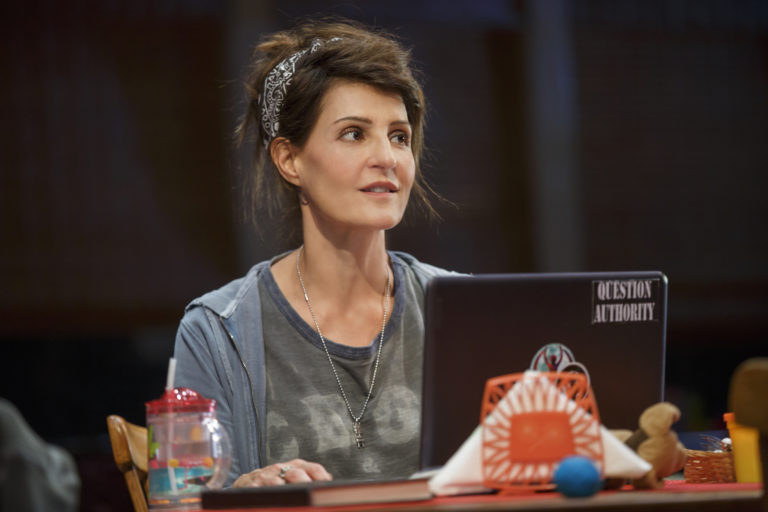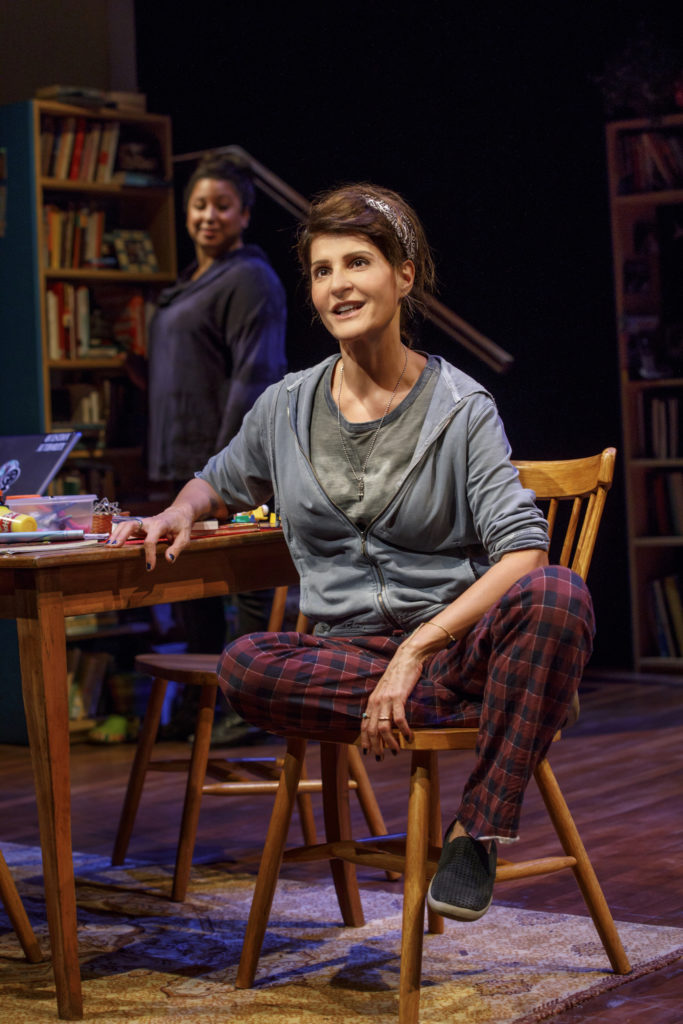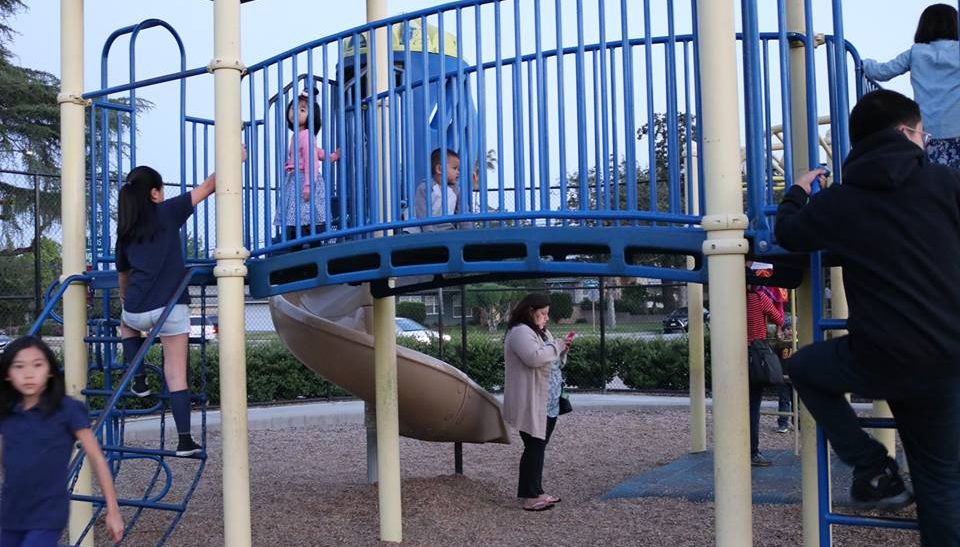
By May S. Ruiz
‘Tiny Beautiful Things,’ which was a New York Times Critics’ Pick when it debuted at the Public Theater, is coming to the Pasadena Playhouse on April 10 until May 5, 2019. It stars Nia Vardalos as Sugar and features Sameerah Luqmaan-Harris, who will play the role of Sugar at select performances, Teddy Cañez, Natalie Woolams-Torres, Giovanni Adams, Adam J. Smith, and Sarah Hollis. Sherri Eden Barber will restage this production based on the original direction by Thomas Kail (of the ‘Hamilton’ fame).
Vardalos, who originated the role of Sugar at the Public Theater under the direction of Thomas Kail, also created the stage adaptation of ‘Tiny Beautiful Things’ based on the New York Times Bestseller of the same name by Cheryl Strayed. The project was conceived by Vardalos in conjunction with Thomas Kail and Marshall Hayman.
Speaking with us on the first day of rehearsals, Vardalos recalls what drew her to Strayed’s book. “Tommy Kail gave me the book and said ‘I think there might be a play in this.’ I read the book on a plane and was overwhelmed by the letters – I cried so hard that I think people must have thought something was wrong. It wasn’t that they’re sad, but it was that I was unleashed, unzipped, opened. It was catharsis.
“The letter writers – their naked emotions and the lack of conceal in any way – were what struck me. The letters were so well-written and Cheryl’s responses were not advice. I didn’t know how I could write it. It terrified me. It was so outside of my comfort zone and, yet, that was what drew me to it. I had finished the script for ‘My Big Fat Greek Wedding 2,’ and I knew at the time that we were about to start filming it. So I felt it was the perfect moment to just jump in on something different.”
“Ironically, it was through social media that we found Cheryl,” Vardalos continues. “We contacted her on Twitter and asked for the rights to the book. It’s a daunting experience to adapt someone else’s writing. And to do it, I had to really get to know Cheryl, which was not a hardship in any way. She’s the most wonderful person and we bonded. It was an incredible partnership from beginning to end.”
“What I found absolutely transformative was the moment I realized that Cheryl wrote the unpaid column particularly because she, too, was grieving and thus was able to relate to the letter writer,” discloses Vardalos. “I was faithful to her words but then I started to get really brave and pulled from one piece and put it in another. Right within her words, I arced the play, and added a narrative. To create conflict, I had the letter writers question me, when the ones in her book didn’t because they loved her right away.”

From the time she started to adapt the book to getting it staged, took three years. Vardalos says, “It was a process that didn’t have boundaries because, luckily, with theatre you have a long time to do it. So I did the workshops for ‘Tiny Beautiful Things’ in between filming, editing, and world-touring for ‘My Big Fat Greek Wedding 2,’ then I came back and did the play. After the first run I changed it again to add some humor for the second run. I realized that even though there was a funny bit in the latter part of the play, the audience didn’t know they had permission to laugh – I put humor in the beginning so they would know.”
It’s surprising to learn that when ‘Tiny Beautiful Things’ played in New York, more than 50 percent of the audience was male. Vardalos conjectures, “I think that anyone can sit there in the audience and feel. These pieces are open to everyone’s interpretation. For example, even though I cannot personally relate to some of the pieces, what gets me every time is the advice because it’s illuminating rather than instructional, nobody wants to be told what to do. And it seems that Cheryl intuitively knows that, and that’s why I love her advice columns – they’re not authoritative, they’re transparent, and storytelling. It was heartening to look out there and see at least half the audience be men and that they would come back. It was amazing.”
When Vardalos started adapting the book, she hadn’t thought about who would play the role of Sugar. She says, “Cheryl has a way of knowing the truth. After sitting down with her, she asked me, ‘Do you want to play Sugar?’ and in that moment I realized I did. And I was as honest as I always am, and I said ‘Yes, please.’”
However, knowing the characters intimately doesn’t inevitably mean the writer could do a better job of playing the part. Vardalos explains, “In my entire career, I have seen actors take my words and give them life. I don’t think the person who puts fingertips to keyboard is necessarily the best person to play a role. Tommy and I set out to create a role and many roles that were not bound by ethnicity, age, or gender because we want it to be as open as Cheryl is.
“I’ve now seen Sugar played by an African American woman named Opal Alladin who knocked it out of the park in San Diego. Cheryl has seen a woman play Sugar in Portland who is white. It’s going on stage in New Haven, Connecticut and in Seattle, Washington. So it’s really cool! It’s gender-less and race-less and it’s all the things we want it to be. I want to learn and see what other people do with it. In fact, I wrote in the notes ‘I look forward to upcoming productions in which you will interpret this play with your love, creativity, and ingenuity. Above all, I hope you will always remember that the letters are real.’”

“Can we talk about the cast now?” Vardalos requests excitedly, “We had to cast people who were incredibly diverse. Tommy had envisioned them to embody the characters without changing costumes, voices, or accents; it was all about attitude, character, emotions, and personality. We tried a lot of different ways of accomplishing this when we were workshopping. And Tommy obviously knows what he’s doing; he knows when something feels right and he doesn’t waver. I also love that he would ask me ‘Okay? Feel good to you?’ And there was never a moment when I didn’t go ‘Yeah! Okay!’”
“So we have these wonderfully multi-talented actors. For example, one actor plays a man who’s confused about whether to tell his girlfriend how he feels. Then 20 minutes into the play, the same actor plays a transgender person. We have a man who’s my online troll and is incessantly vulgar, needling Sugar with online abuse. And by the end of the play, is a grieving father. Natalie has the role of someone who doubts me the most in the play, then becomes my mother who showers love on Sugar.”
About her experience playing the role of Sugar, Vardalos describes, “We did eight shows a week for three months during the first round, then we did eight shows a week for four months during the second round. Whenever I’m asked how many times I’ve played Sugar I say ‘not enough,’ and it’s not meant to be a glib answer. Every time I think I’m finished with the run, I can’t wait to do it again. There’s something about the play that always affects us– we’ll sit in the wings and hear the audience coming in and we get really excited because they haven’t heard it yet. And the stories are so uplifting and cathartic. The audience walks out happy and high because they felt something. Isn’t that where we’re all at right now? Just to feel something that will let us get away from all the craziness. We’ve got political fatigue; the news cycles just weigh on us.”
The audience reaction is as varied as the number of times the play is staged. Clarifies Vardalos, “Each audience is different, which is what’s great about live theatre. But, more often than not, the story that I tell about my mother is the one that affects people. It’s where Natalie plays the part of a young girl who was raped. There’s a part when I’m heading downstage and Natalie goes upstage, then goes over to the side and becomes Sugar’s mother. That’s my favorite moment in the play because to see this young actress who’s 28 years old transform like that … it gives me the shivers every time. She literally goes from being vulnerable to commanding and I love it! In just a turn, she transforms! And I love the reaction of the audience.”
Much has transpired since ‘Tiny Beautiful Things’ opened in New York, Vardalos enthuses, “We published the play and it has been licensed by approximately 25 theatres across the U.S. It’s been translated to Spanish and it’s going to be in Mexico and Uruguay. I hope to bring it to Greece and it’s going to be a touring production. This Pasadena production is the first time the New York cast is being brought back from the Public Theatre. It’s so exciting! This is so unique because I didn’t just pull one or two people – it’s all the actors, the production designer, the costumer, the sound designer, Tommy’s associate Sherry Barber – it’s everybody. We’re all still so close, which is rare. We played it one year and two months ago in New York. We closed December 18, 2017 and we’re opening here on April 10, 2019.”
“When Pasadenans see ‘Tiny Beautiful Things’ I just want them to say ‘That’s me!’ Because as Chery Strayed says ‘We’re all Sugar,’” Vardalos pronounces.




